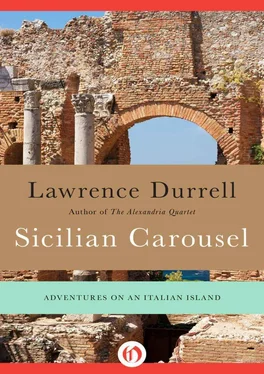In one side chapel there was some sort of office being read aloud by a young sleek priest. His only congregation consisted of two old washerwomen who seemed to be half-asleep. But in the duskier hinterland of the church there were children skirmishing and their sharp little voices made the priest half cock a reproachful eye in their direction. But the reading went on with a suavity which suggested not only his pleasure in language but also the knowledge that he had a fine voice for poetry. He was clad all in green, a color which I usually associated with Byzantine robes. He looked like a slim and self-possessed green lizard standing at the elaborately carved lectern.
But while we were all marching about the great cathedral, full of the pleasant inner disturbance which comes from a shock of aesthetic pleasure, it was Miss Lobb who hit upon the most appropriate gesture with which to acknowledge it. She walked quietly away into the body of the church and, kneeling down in a pew, covered her face to pray. It was rather moving, the simple inevitability of the act. After a moment of hesitation the dentist and his lady followed suit. It was then that I saw the Bishop’s throat contract with sympathetic emotion, and he gave a distinct sob on a funny juvenile note — like a boy of fourteen. It was another revelatory moment of insight, the little gesture of concern and affection sketched by his wife in taking his arm. That sob of a choirboy with an unbroken voice somehow made me see in a flash that he had been wrestling with weighty inner stresses, problems, in a word, Doubts. Later when Roberto told me about his nervous breakdown — his losses of memory, nagging insomnia, bursting into tears in the pulpit … it all related itself back to that moment of stress and the little sob. Yet — am I wrong? — I felt that he had an overwhelming desire to imitate Miss Lobb and kneel down in prayer but was held back by some unconscious and unformulated scruples against the heathen relics embedded in the church walls; the presence of Athena, in fact. But perhaps not, perhaps I am just romancing. At any rate the fact remains that he watched Miss Lobb with a kind of hungry envy, but just stood there, with his wife’s sympathetic and restraining and comforting hand on his arm.
I was not too sophisticated to follow suit though what prayers I had to offer up were addressed rather in the direction of Athena than in that of the Virgin. But the pleasure in the graciousness of the building persisted. And it was here that Martine had tried to interest her children in the history of Greek Sicily — which is really to say Syracuse, for everything started here on this queer little island. At first she was exasperated by the flatness of the guidebook accounts, but gradually as she went on trying to make the history come alive to the children she began to “see” it herself as something real and full of color. It is not the fault of the guides for they are forced to be dryly accurate; they cannot afford the coloring matter which gives such pith and vision to master journalists like Suetonius, who knows exactly when to add that small distinguishing visual touch which brings the subject alive. With a harelip, a mole, a squint, a tonsure … with one little attribute the whole portrait breathes. But now, in Syracuse, reading about the great Gelon of Gela all the guide book is allowed to do is to repeat the name of this remarkable but unknown man — the man who began everything here that gathered weight and shaped itself into the great efflorescence of Greek culture which even today as a relic quickens and moves us. Who the devil was Gelon when all is said and done?
The ambitious and energetic tyrant of Gela had already shown his restlessness and administrative skill by making a diplomatic marriage to Damarete, the beautiful daughter of a neighboring tyrant at Akragas, Theron by name. But his real chance came when he received an invitation from the aristocratic party in Syracuse to come and govern the city. He seized it with both hands, happy to see his powers extended further still in a three-cornered diplomatic federation which was to stand the acid test of the Carthaginian assault at Himera.
The numerologists insist that both in individual lives and in the lives of nations there are fateful days and fateful years; for England 1066, 1588, 1814, 1940.… For ancient Greek culture there came such a day in 480 BCE when the Greek spirit asserted once and for all its powers of light and its resolve to flower into its prime. On this same day while Gelon and his confederation were securing for Sicily almost a century of peace and security, the Athenian forces were defeating the Persian armies and clearing themselves a same sort of space in which to grow and flower and assume their birthright as a mature nation. It is not recorded whether the astrologers played any part in predicting these two immortal victories. Even at this remove in time they seem by no means a predictable thing — when one considers the massive forces ranged against the Greeks, both Sicilian and metropolitan. Yet the historians do not seem to be unduly surprised, or perhaps we do not catch their tone correctly. But nothing more decisive could be imagined, and in the aftermath of victory there came a flush of triumphant and triumphal building, of which this fine cathedral is one of the late results. Thousands of slaves were taken prisoner after Himera and set to work on these projects. The new temple of Athena was especially designed to reflect and celebrate the decisive battle. Gelon’s reign was astonishingly short — as short as it was decisive. Yet he had burst open the doors of Greek history.
As for the famous temple, he did not live to see it completed as he died in 478, but he bequeathed all he had to his brother Hieron I who had been his deputy at Gela. His was not a long rule either but such had been the decisiveness of the victory over the Carthaginians at Himera that he could afford to draw breath. A period of peaceful prosperity and culture dawned in Syracuse; Hieron showed himself a discriminating patron of the arts and the list of visiting luminaries is impressive; it allows one to have some reservations as to the appalling portrait of Hieron painted by worthy Diodorus, who says he was as avaricious as he was violent, and an utter stranger to sincerity and nobility of character. We must weigh this bit of character assassination against the fact that Pindar, Aeschylus, and Simonides all found a generous welcome at his court. Pindar (am I wrong to think of him as a somewhat laborious poet?) stayed a whole year and extolled his host’s skills in several unusual domains like chariot racing. Aeschylus seems to have had quite a love affair with Sicily; it is believed that he had the luck to get his Prometheus Bound and Prometheus Freed produced in the theater here, presumably at a time when his work was still felt to be modern and rather revolutionary in style. But then there is so much that we don’t know, presumably may never know. Eighty of his plays are known only by title, and a mere seven survive. In the puzzling epitaph he wrote upon himself he seems to extol his military service at the expense of his art — which makes Deeds rather distrustful of his sincerity. The soldier has an absurdly high opinion of men who can write, and not much use for the “service mentality” as he calls it. But then civilians are always prouder of having borne arms than regulars are. At any rate the dramatist actually retired to Gela to live out his declining days; perhaps the very things which made old Gelon fume with impatience — the absence of a harbor, the seclusion of the quiet little town on its promontory high over the sea, its remoteness from the bustle of everyday politics … were the very things which made it precious in the eyes of Aeschylus. Or was it perhaps something else of which the tyrant himself may never have been aware? I mean the existence of the secret religious sect professing a Pythagorean life and principle? We know that there was such a sect of philosophers in Gela.
Читать дальше











